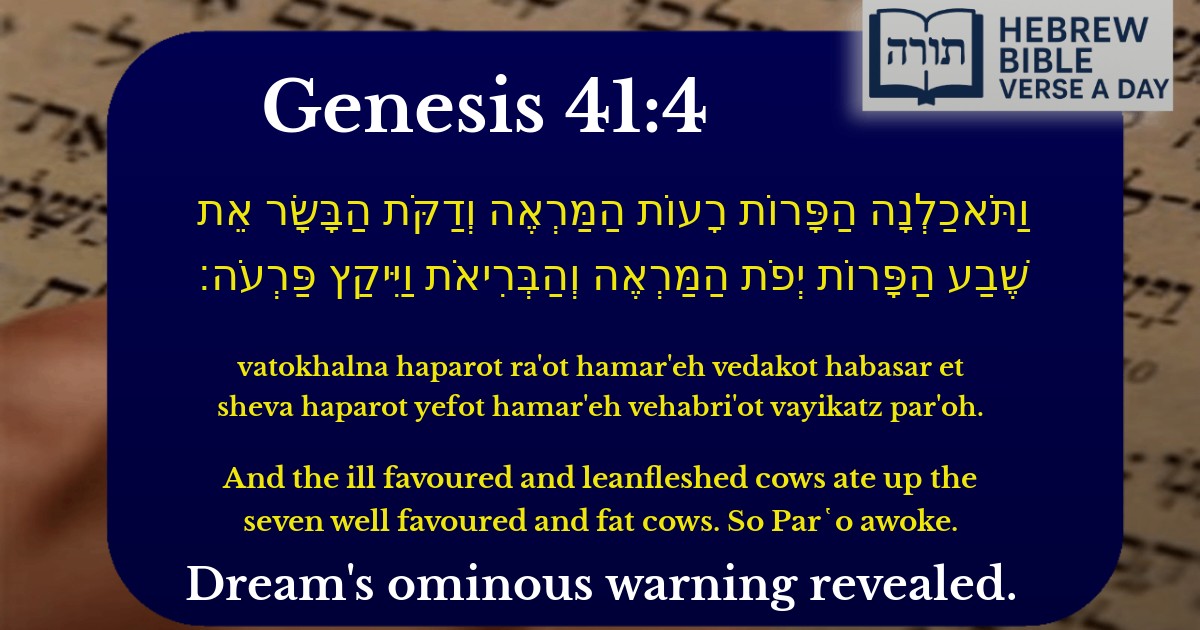Join Our Newsletter To Be Informed When New Videos Are Posted
Join the thousands of fellow Studends who rely on our videos to learn how to read the bible in Hebrew for free!
Hebrew Text
וַתֹּאכַלְנָה הַפָּרוֹת רָעוֹת הַמַּרְאֶה וְדַקֹּת הַבָּשָׂר אֵת שֶׁבַע הַפָּרוֹת יְפֹת הַמַּרְאֶה וְהַבְּרִיאֹת וַיִּיקַץ פַּרְעֹה׃
English Translation
And the ill favoured and leanfleshed cows ate up the seven well favoured and fat cows. So Par῾o awoke.
Transliteration
Vatokhalna haparot ra'ot hamar'eh vedakot habasar et sheva haparot yefot hamar'eh vehabri'ot vayikatz par'oh.
Hebrew Leining Text
וַתֹּאכַ֣לְנָה הַפָּר֗וֹת רָע֤וֹת הַמַּרְאֶה֙ וְדַקֹּ֣ת הַבָּשָׂ֔ר אֵ֚ת שֶׁ֣בַע הַפָּר֔וֹת יְפֹ֥ת הַמַּרְאֶ֖ה וְהַבְּרִיאֹ֑ת וַיִּיקַ֖ץ פַּרְעֹֽה׃
וַתֹּאכַ֣לְנָה הַפָּר֗וֹת רָע֤וֹת הַמַּרְאֶה֙ וְדַקֹּ֣ת הַבָּשָׂ֔ר אֵ֚ת שֶׁ֣בַע הַפָּר֔וֹת יְפֹ֥ת הַמַּרְאֶ֖ה וְהַבְּרִיאֹ֑ת וַיִּיקַ֖ץ פַּרְעֹֽה׃
🎵 Listen to leining
Parasha Commentary
📚 Talmud Citations
This verse is quoted in the Talmud.
📖 Berakhot 55b
The verse is referenced in the context of discussing dreams and their interpretations, particularly in relation to Pharaoh's dream as interpreted by Joseph.
📖 Chullin 95b
The verse is mentioned in a discussion about the nature of dreams and their significance, using Pharaoh's dream as an example.


Context of the Verse
This verse (Bereshit 41:4) describes Pharaoh's dream in which seven emaciated cows devour seven healthy, robust cows. This dream, along with the subsequent dream of withered ears of grain consuming healthy ones, sets the stage for Yosef's interpretation and rise to power in Egypt.
Rashi's Explanation
Rashi (Bereshit 41:4) notes that the dream's disturbing imagery—weak cows consuming strong ones—signifies that years of famine will be so severe they will "consume" and erase the abundance of the years of plenty. The fact that Pharaoh awoke immediately after this part of the dream indicates its profound impact on him.
Symbolism of the Cows
Pharaoh's Reaction
The verse concludes with Pharaoh awakening abruptly. The Kli Yakar (Bereshit 41:4) explains that this sudden awakening reflects Pharaoh's deep distress over the dream's ominous message. His subconscious recognized the severity of the vision even before Yosef's interpretation.
Broader Lessons
The Sforno (Bereshit 41:4) teaches that this episode demonstrates Divine Providence—Hashem was preparing Egypt (and ultimately Yaakov's family) for the upcoming famine by giving Pharaoh this warning in advance. The dream also highlights the principle that prosperity can be fleeting if not managed wisely, a lesson reinforced by Yosef's subsequent advice to store grain during the years of plenty.